牛津译林版(2019)选择性必修 第一册Unit 2 The Universal Language Extended reading 课件(共40张PPT)
文档属性
| 名称 | 牛津译林版(2019)选择性必修 第一册Unit 2 The Universal Language Extended reading 课件(共40张PPT) |
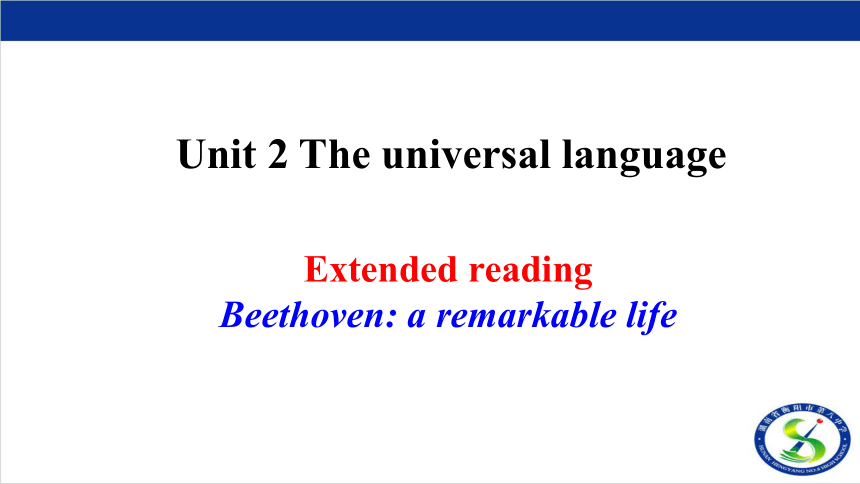
|
|
| 格式 | pptx | ||
| 文件大小 | 161.6MB | ||
| 资源类型 | 教案 | ||
| 版本资源 | 牛津译林版(2019) | ||
| 科目 | 英语 | ||
| 更新时间 | 2023-07-14 08:21:32 | ||
图片预览

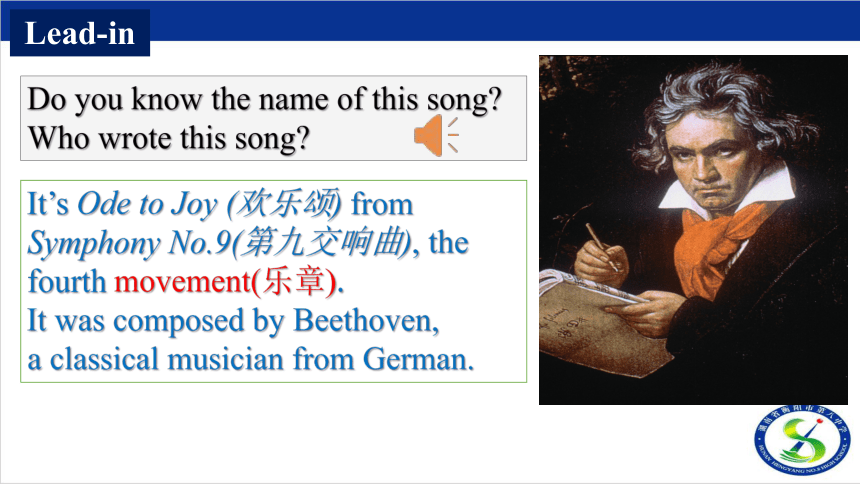
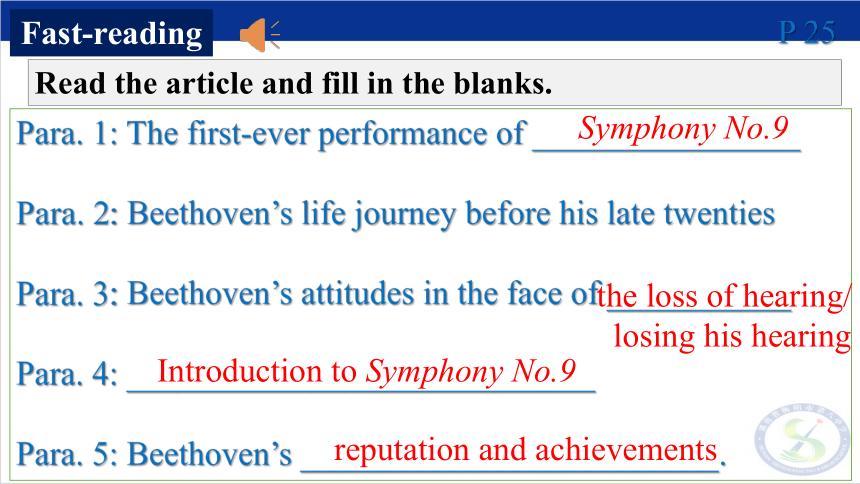
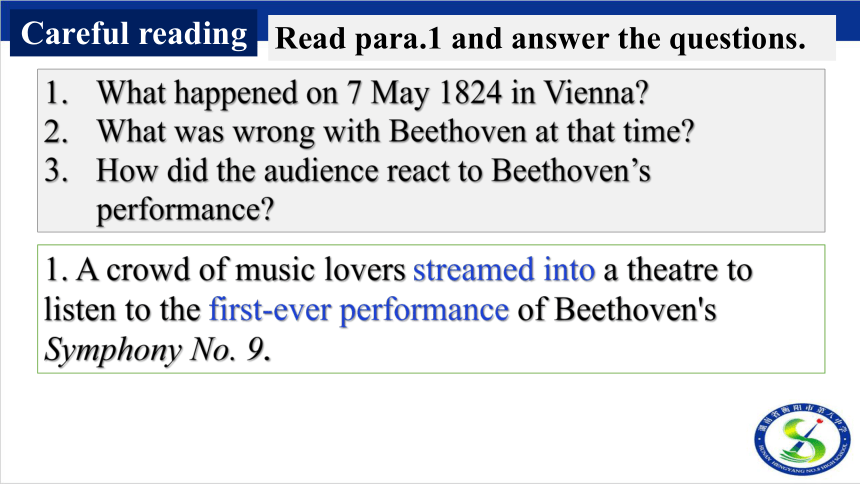
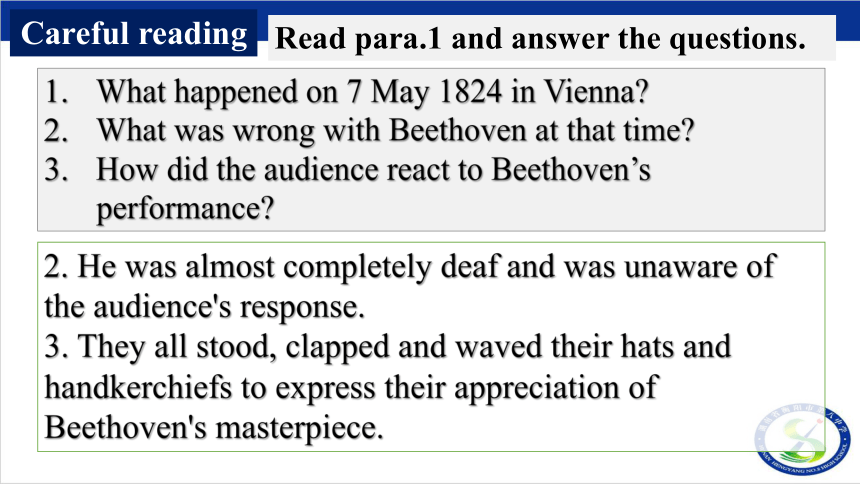
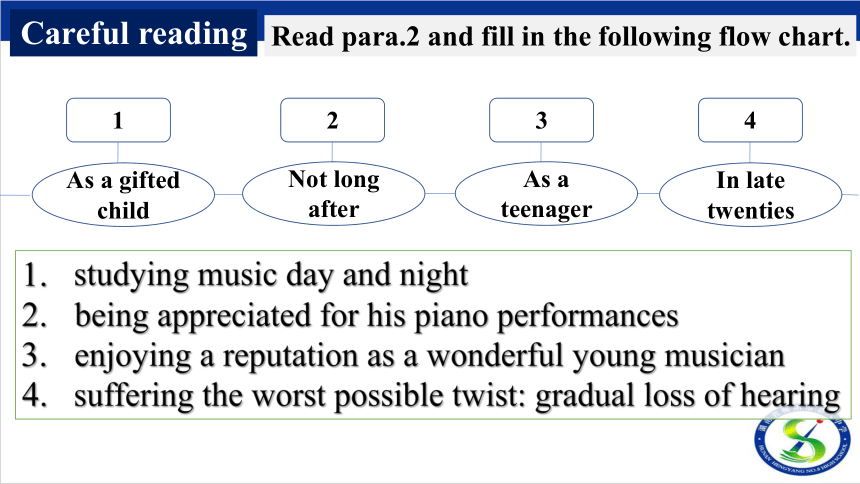

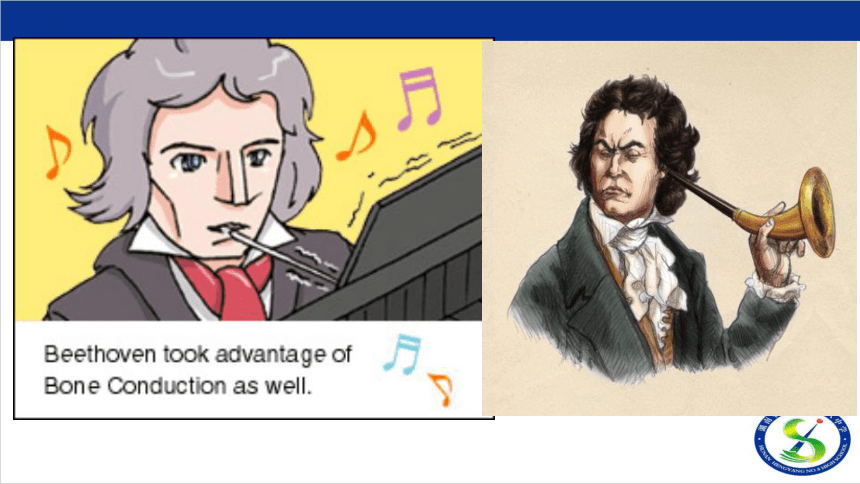
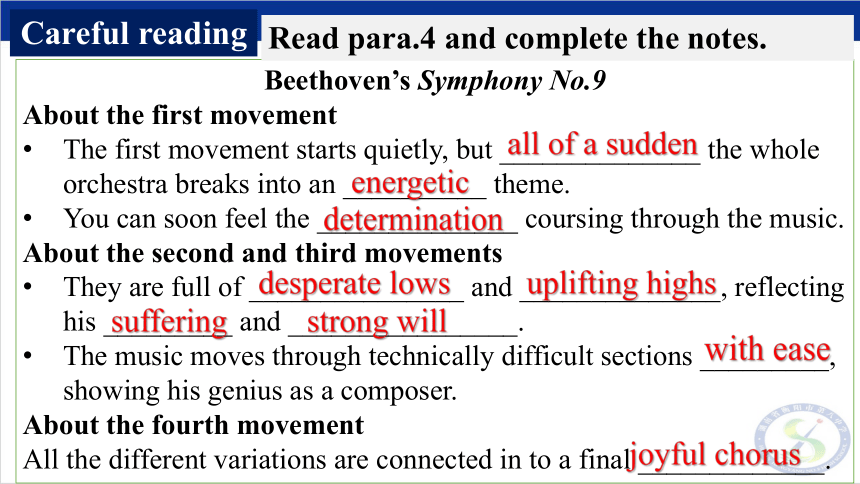
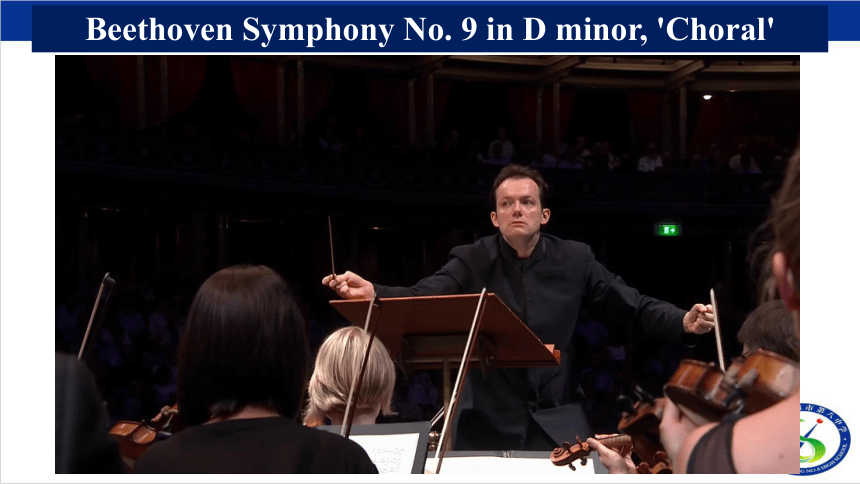
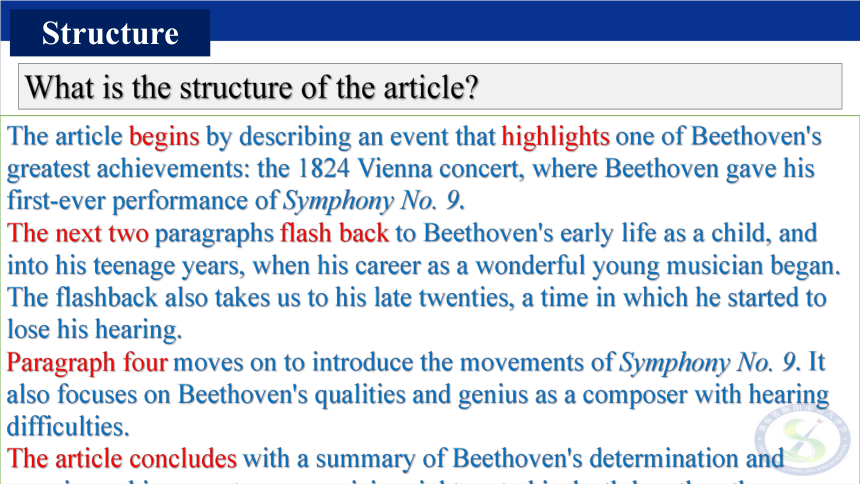
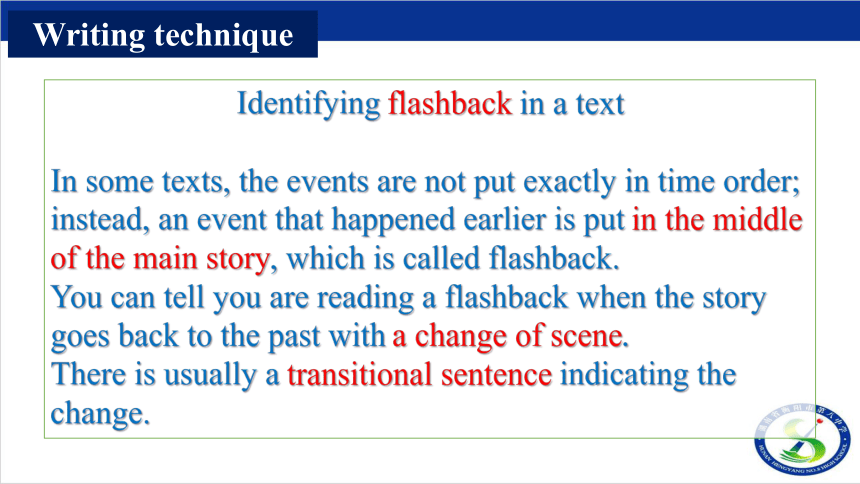
文档简介
(共40张PPT)
Extended reading
Beethoven: a remarkable life
Unit 2 The universal language
Lead-in
Do you know the name of this song
Who wrote this song
It’s Ode to Joy (欢乐颂) from Symphony No.9(第九交响曲), the fourth movement(乐章).
It was composed by Beethoven,
a classical musician from German.
Para. 1: The first-ever performance of ________________
Para. 2: Beethoven’s life journey before his late twenties
Para. 3: Beethoven’s attitudes in the face of ___________
Para. 4: ____________________________
Para. 5: Beethoven’s _________________________.
Symphony No.9
the loss of hearing/
losing his hearing
Introduction to Symphony No.9
reputation and achievements
Fast-reading
Read the article and fill in the blanks.
P 25
Careful reading
1. A crowd of music lovers streamed into a theatre to listen to the first-ever performance of Beethoven's Symphony No. 9.
What happened on 7 May 1824 in Vienna
What was wrong with Beethoven at that time
How did the audience react to Beethoven’s performance
Read para.1 and answer the questions.
Careful reading
2. He was almost completely deaf and was unaware of the audience's response.
3. They all stood, clapped and waved their hats and handkerchiefs to express their appreciation of Beethoven's masterpiece.
What happened on 7 May 1824 in Vienna
What was wrong with Beethoven at that time
How did the audience react to Beethoven’s performance
Read para.1 and answer the questions.
Careful reading
Read para.2 and fill in the following flow chart.
1
As a gifted
child
Not long after
As a teenager
In late twenties
2
3
4
studying music day and night
being appreciated for his piano performances
enjoying a reputation as a wonderful young musician
suffering the worst possible twist: gradual loss of hearing
Careful reading
Beethoven suffered from the loss of hearing, which could be the most terrible thing to happen to a musician.
To overcome this problem, he used a variety of hearing aids. He would put one end of a pencil in his mouth and place the other end against the instrument. In this way, he could feel the notes.
What was the biggest problem Beethoven faced in his life How did he try to overcome this problem
Read para. 3 and answer the questions.
Careful reading
Beethoven’s Symphony No.9
About the first movement
The first movement starts quietly, but ______________ the whole orchestra breaks into an __________ theme.
You can soon feel the ______________ coursing through the music.
About the second and third movements
They are full of _______________ and ______________, reflecting his _________ and ________________.
The music moves through technically difficult sections _________, showing his genius as a composer.
About the fourth movement
All the different variations are connected in to a final _____________.
Read para.4 and complete the notes.
all of a sudden
energetic
desperate lows
with ease
joyful chorus
determination
uplifting highs
suffering
strong will
Beethoven Symphony No. 9 in D minor, 'Choral'
Structure
What is the structure of the article
The article begins by describing an event that highlights one of Beethoven's greatest achievements: the 1824 Vienna concert, where Beethoven gave his first-ever performance of Symphony No. 9.
The next two paragraphs flash back to Beethoven's early life as a child, and into his teenage years, when his career as a wonderful young musician began. The flashback also takes us to his late twenties, a time in which he started to lose his hearing.
Paragraph four moves on to introduce the movements of Symphony No. 9. It also focuses on Beethoven's qualities and genius as a composer with hearing difficulties.
The article concludes with a summary of Beethoven's determination and amazing achievements as a musician right up to his death less than three years after the Vienna concert.
Writing technique
Identifying flashback in a text
In some texts, the events are not put exactly in time order; instead, an event that happened earlier is put in the middle of the main story, which is called flashback.
You can tell you are reading a flashback when the story goes back to the past with a change of scene.
There is usually a transitional sentence indicating the change.
Can you find the transitional sentence that enables you to tell you are reading a flashback And try to explain the function of it.
The transitional sentence is the first sentence in paragraph 2: "Symphony No. 9 was Beethoven's last major piece of music in a vast body of works written throughout his remarkable life."
It serves as a link between the preceding scene of the first-ever performance of Symphony No. 9 and Beethoven's life journey that is described in the following paragraphs.
Writing technique
Thinking
Find out Beethoven’s qualities as a musician by adding nouns to the following chart.
optimism
determination
devotion
Qualities of Beethoven
diligence
...
intelligence
creativity
talent
persistence
passion
Discussion
Beethoven’s qualities as a musician, what do you think makes a great musician Make a list of the qualities and explain why they are important.
Talent
Having a talent for music can help a musician develop into a great musician.
Creativity
Imagination and artistic vision allow a great musician to create music that is unique.
Discussion
Determination
Being a musician is not easy, and when things go wrong, he or she must be able to get through those darkest moments in order to achieve greatness.
Passion
To have a passion for music means that a great musician loves what he or she is doing, so it is not just a job or a career; instead, it is an important part of his or her life.
Language Points
1. ... a crowd of music lovers streamed into a theatre in Vienna to hear the first-ever performance of ... (lines 1-2)
stream into 流入,涌入 ;蜂拥而进
stream n. 溪流,(液/气人/车)流; 源源不断(的事情)
a _____/ ______/ _____/______ stream (清澈/欢跳/湍急/平静)
一缕光线
历史潮流
滔滔不绝的话
川流不息
进行生产,投入生产
clear
dancing
rapid
quiet
a stream of light
the stream of history
a stream of words
in streams
on stream
stream v. 流,流动;冒出;鱼贯而行;飘动
Tears streamed ______ his face. (沿着)
Blood was streaming _____ (从) her head.= Her head was streaming ____ blood.
People streamed ______ the bridge. (桥上行人川流不息)
Her scarf streamed ______ her. (在身后)
Crowds were streaming _____ ____ the station. (涌出)
along
from
with
cross
behind
out of
2. ... and they broke into enthusiastic cheers ... (line 4)
but all of a sudden the whole orchestra breaks into an energetic theme (line 33)
break into 突然开始做...
破门而入,成功进入...(领域)
She finally broke into films after an acclaimed stage career.
成为碎片
突然大哭
break into pieces
break forth into tears
break 的常见搭配
1.break down 破坏,毁掉;破除;坍塌, 坏掉;(计划等)失败, 破裂;(健康、精神)崩溃
2. break up 解散,驱散 ;(学校等)放假;结束,破裂;击碎
3. break in 破门而入,打断
4. break into 破门而入,突然……起来
5. break out 战争爆发,争吵爆发,(火灾)发生
6. break away from 打破陈规;奋力挣脱;放弃习惯
7. break through 出现,突破
8. break the record 破纪录
9. break one’s heart 使某人心碎, 使某人悲痛欲绝
1.The old rules must be broken ________.
2. Last night, a thief broke ______ and stole his iphone.
3. She’s just broken ____ with his boyfriend.
4. I’ve heard a quarrel broke _____ between them.
5. It was a cloudy day, but the sun at last broke ________.
6. Hearing the sad news, the old woman _______ _______ ______.
7. Let’s _____ _____ the whole ______ parts. 让我们化整为零。
8. You’d better _____ ______ ______ the habit of smoking.
9. The mirror fell to the ground and ______ ____ _______. (摔成碎片)
10. After a long time of hard work, he almost ______ ______.
in
down
up
Practice makes perfect.
out
through
broke into tears
break up
into
break away from
broke into pieces
broke down
3. Beethoven, was unaware of the audience’s response until one of the singers turned him around to face the crowd. (lines 5-6)
用终止性动词作谓语时,until既可以和not连用,又可以和never, nobody,nothing,few,little,seldom,hardly, un-等含否定意义的词连用。
I had not seen him until 2020.
= I had never seen him until 2020.
Don’t put off until tomorrow what you can do today.
= Never put off what you can do today till tomorrow.
4. ... to express their appreciation of his masterwork. (L 8)
Not long after, he began to be appreciated for his piano performances. (L11-12)
appreciate v.欣赏,感激,领会
1. He appreciated their __________ (confident).
2. We shall appreciate _________ (hear) from you again.
3. I appreciate _______ you have come here so early.
4. I would really/deeply/much/highly appreciate _____ if you would help me with it.
5. I _________ your kindness.
I _________ you for your kindness.
confidence
hearing
that
it
appreciate
thank
5. By the time he was a teenager, he had already enjoyed a reputation as a wonderful young musician. (lines 12-13)
by the time意为“到……时候(为止)”
(1)如果从句中的谓语动词是一般过去时,那么主句中的谓语动词通常用过去完成时,表示“截止到从句动作发生时,主句动作已经完成,即过去的过去”。例如:
By the time he was fourteen years old,Einstein had learned advanced mathematics all by himself.
1. When I talked with my grandma on the phone, she sounded weak, but by the time we ____ up, her voice had been full of life.
A. were hanging B. had hung C. hung D. would hang
2. By the time Jack returned home from England, his son _____from college.
A. graduated B. has graduated C. had been D. had graduated
Practice makes perfect.
C
D
6. However, life took a sharp turn. In his late twenties, Beethoven suffered one of the worst possible twists for a musician. (Lines15-16)
twist v. & n.
扭转,扭歪,扭弯,弯曲,缠绕,编织
歪曲, 曲解, 曲折
1. The wire ____________(twist) easily.
2. If you ________(twist) the cork, it will come out of the bottle.
3. The mountain road is full of ________(twist).
4. There's _____ unusual twist to the plot at the end of the book.
twists/twisted
twist
twists
an
7. ... a sense which I once possessed in the greatest perfection… (line21)
possess “占有,拥有”,指人或物具有某种品质、性质、能力或特征。其后可接有形的东西,也可接特点、能力、气质等抽象名词作宾语,总之,表示拥有好的东西。
Rose is a woman who possesses a rare intelligence.
n. possession
in possession of
possess 和own 这两个词都有“有”的意思。其区别是:
1. own强调具有合法权利占有、继承某物作为财产的意思,所占有的物必须有相当的价值; possess则不管采用何种方法得到。例如:
The police asked me if I possessed a gun.
His family owned neither land nor house.
2. possess多用于好的事物,而own则好坏均可。
I'm afraid he doesn't possess a sense of humour.
8. Beethoven never abandoned hope.(line 22)
abandon v. 放弃,抛弃,放纵
In his early days he abandoned medicine for literature.
Those who abandon themselves to despair can not succeed.
9. The music moves through technically difficult sections with ease, showing his genius as a composer. (lines 37-38)
with ease 轻松地,不费力地
Jenny is always able to pass the exams with ease.
genius n. 天才,天赋,天资
She is a writer of genius and her novels are quite widely read.
Jenny总能轻松通过考试。
她是一位天才作家,创作的小说读者甚众。
10. As Beethoven’s last great work, his Symphony No. 9 was also a grand finale to his life. (lines 40-41)
finale [f 'n li] 结束,终曲
a fitting finale to the day’s event
当天活动的圆满结束
5. By the time he was a teenager, he had already enjoyed a reputation as a wonderful young musician. (lines 12-13)
by the time意为“到……时候(为止)”
(1)如果从句中的谓语动词是一般过去时,那么主句中的谓语动词通常用过去完成时,表示“截止到从句动作发生时,主句动作已经完成,即过去的过去”。例如:
By the time he was fourteen years old,Einstein had learned advanced mathematics all by himself.
(2)如果从句中的谓语动词为一般现在时/或现在完成时(表将来),那么主句中的谓语动词常为将来完成时,表示“截止到将来某一时间为止,主句动作将已经完成”。
By the time John finishes his homework, his classmates shall have left to play football.
3. 如果主句动作不强调已经完成,只是说明某个时候的状况,(主句是be的系表形式或者是表示像know, find, believe等表示认知的持续性动词,则往往用一般时态,不用完成时态。)此时主句不用完成时,而应根据实际需要选用适当的时态,此时by the time相当于when。 例如:
He was out of breath by the time he reached the top.
By the time the war was over , death and suffering were to be seen everywhere.
在战争结束的时候,到处可见死亡和饥饿。 这里没有“死亡和饥饿”已经完成的意思,只是描述当时这个时间点的状况。所以用过去时。
1. By the time Jane gets home, her aunt _____for London to attend a meeting.
A. will leave B. leaves C. will have left D. left
2. By the time you have finished this book, your meal ___ cold.
A. gets B. has got C. will get D. is getting
3. When I talked with my grandma on the phone, she sounded weak, but by the time we ____ up, her voice had been full of life.
A. were hanging B. had hung C. hung D. would hang
4. By the time Jack returned home from England, his son _____from college.
A. graduated B. has graduated C. had been D. had graduated
5. By the time he realizes he _____into a trap, it’ll be too late for him to do anything about it.
A. walks B. walked C. has walked D. had walked
6. The telephone_____, but by the time I got indoors, it stopped.
A. had rung B. was ringing C. rings D. has rung
Practice makes perfect.
C
C
C
D
C
B
Text Review
1. A crowd of music lovers ______________(涌入) a theatre in Vienna to hear the first-ever performance of the great Ludwig van Beethoven’s Symphony No. 9.
2. They _____________(爆发出) enthusiastic cheers at the end of symphony.
3. Before him, he saw __________(sea) people all standing, clapping, and waving their hats and handkerchiefs to express their ___________ (appreciate) of his masterwork.
4. As a ________(gift) child, Beethoven____________ (push) by his father to study music day and night.
streamed into
broke out
a sea of
appreciation
gifted
was pushed
Text Review
5. The ______ (lose)of his hearing deeply depressed Beethoven.
6. “...how could I possibly admit a __________ (weak) in the one sense which should be more perfect_____ me than in others, a sense which I once possessed ______the greatest perfection...”
7. ________ his hearing loss, he was ____________(determine) to find a way to continue living a life full of music.
8. Since that day, Beethoven’s Symphony No. 9 has become one of the most famous and ________(treasure) pieces in the history of classic music.
9. In the fourth movement, he connects all of the different _________
(vary) into a joyful chorus.
loss
weakness
in
in
Despite
treasured
determined
variations
Extended reading
Beethoven: a remarkable life
Unit 2 The universal language
Lead-in
Do you know the name of this song
Who wrote this song
It’s Ode to Joy (欢乐颂) from Symphony No.9(第九交响曲), the fourth movement(乐章).
It was composed by Beethoven,
a classical musician from German.
Para. 1: The first-ever performance of ________________
Para. 2: Beethoven’s life journey before his late twenties
Para. 3: Beethoven’s attitudes in the face of ___________
Para. 4: ____________________________
Para. 5: Beethoven’s _________________________.
Symphony No.9
the loss of hearing/
losing his hearing
Introduction to Symphony No.9
reputation and achievements
Fast-reading
Read the article and fill in the blanks.
P 25
Careful reading
1. A crowd of music lovers streamed into a theatre to listen to the first-ever performance of Beethoven's Symphony No. 9.
What happened on 7 May 1824 in Vienna
What was wrong with Beethoven at that time
How did the audience react to Beethoven’s performance
Read para.1 and answer the questions.
Careful reading
2. He was almost completely deaf and was unaware of the audience's response.
3. They all stood, clapped and waved their hats and handkerchiefs to express their appreciation of Beethoven's masterpiece.
What happened on 7 May 1824 in Vienna
What was wrong with Beethoven at that time
How did the audience react to Beethoven’s performance
Read para.1 and answer the questions.
Careful reading
Read para.2 and fill in the following flow chart.
1
As a gifted
child
Not long after
As a teenager
In late twenties
2
3
4
studying music day and night
being appreciated for his piano performances
enjoying a reputation as a wonderful young musician
suffering the worst possible twist: gradual loss of hearing
Careful reading
Beethoven suffered from the loss of hearing, which could be the most terrible thing to happen to a musician.
To overcome this problem, he used a variety of hearing aids. He would put one end of a pencil in his mouth and place the other end against the instrument. In this way, he could feel the notes.
What was the biggest problem Beethoven faced in his life How did he try to overcome this problem
Read para. 3 and answer the questions.
Careful reading
Beethoven’s Symphony No.9
About the first movement
The first movement starts quietly, but ______________ the whole orchestra breaks into an __________ theme.
You can soon feel the ______________ coursing through the music.
About the second and third movements
They are full of _______________ and ______________, reflecting his _________ and ________________.
The music moves through technically difficult sections _________, showing his genius as a composer.
About the fourth movement
All the different variations are connected in to a final _____________.
Read para.4 and complete the notes.
all of a sudden
energetic
desperate lows
with ease
joyful chorus
determination
uplifting highs
suffering
strong will
Beethoven Symphony No. 9 in D minor, 'Choral'
Structure
What is the structure of the article
The article begins by describing an event that highlights one of Beethoven's greatest achievements: the 1824 Vienna concert, where Beethoven gave his first-ever performance of Symphony No. 9.
The next two paragraphs flash back to Beethoven's early life as a child, and into his teenage years, when his career as a wonderful young musician began. The flashback also takes us to his late twenties, a time in which he started to lose his hearing.
Paragraph four moves on to introduce the movements of Symphony No. 9. It also focuses on Beethoven's qualities and genius as a composer with hearing difficulties.
The article concludes with a summary of Beethoven's determination and amazing achievements as a musician right up to his death less than three years after the Vienna concert.
Writing technique
Identifying flashback in a text
In some texts, the events are not put exactly in time order; instead, an event that happened earlier is put in the middle of the main story, which is called flashback.
You can tell you are reading a flashback when the story goes back to the past with a change of scene.
There is usually a transitional sentence indicating the change.
Can you find the transitional sentence that enables you to tell you are reading a flashback And try to explain the function of it.
The transitional sentence is the first sentence in paragraph 2: "Symphony No. 9 was Beethoven's last major piece of music in a vast body of works written throughout his remarkable life."
It serves as a link between the preceding scene of the first-ever performance of Symphony No. 9 and Beethoven's life journey that is described in the following paragraphs.
Writing technique
Thinking
Find out Beethoven’s qualities as a musician by adding nouns to the following chart.
optimism
determination
devotion
Qualities of Beethoven
diligence
...
intelligence
creativity
talent
persistence
passion
Discussion
Beethoven’s qualities as a musician, what do you think makes a great musician Make a list of the qualities and explain why they are important.
Talent
Having a talent for music can help a musician develop into a great musician.
Creativity
Imagination and artistic vision allow a great musician to create music that is unique.
Discussion
Determination
Being a musician is not easy, and when things go wrong, he or she must be able to get through those darkest moments in order to achieve greatness.
Passion
To have a passion for music means that a great musician loves what he or she is doing, so it is not just a job or a career; instead, it is an important part of his or her life.
Language Points
1. ... a crowd of music lovers streamed into a theatre in Vienna to hear the first-ever performance of ... (lines 1-2)
stream into 流入,涌入 ;蜂拥而进
stream n. 溪流,(液/气人/车)流; 源源不断(的事情)
a _____/ ______/ _____/______ stream (清澈/欢跳/湍急/平静)
一缕光线
历史潮流
滔滔不绝的话
川流不息
进行生产,投入生产
clear
dancing
rapid
quiet
a stream of light
the stream of history
a stream of words
in streams
on stream
stream v. 流,流动;冒出;鱼贯而行;飘动
Tears streamed ______ his face. (沿着)
Blood was streaming _____ (从) her head.= Her head was streaming ____ blood.
People streamed ______ the bridge. (桥上行人川流不息)
Her scarf streamed ______ her. (在身后)
Crowds were streaming _____ ____ the station. (涌出)
along
from
with
cross
behind
out of
2. ... and they broke into enthusiastic cheers ... (line 4)
but all of a sudden the whole orchestra breaks into an energetic theme (line 33)
break into 突然开始做...
破门而入,成功进入...(领域)
She finally broke into films after an acclaimed stage career.
成为碎片
突然大哭
break into pieces
break forth into tears
break 的常见搭配
1.break down 破坏,毁掉;破除;坍塌, 坏掉;(计划等)失败, 破裂;(健康、精神)崩溃
2. break up 解散,驱散 ;(学校等)放假;结束,破裂;击碎
3. break in 破门而入,打断
4. break into 破门而入,突然……起来
5. break out 战争爆发,争吵爆发,(火灾)发生
6. break away from 打破陈规;奋力挣脱;放弃习惯
7. break through 出现,突破
8. break the record 破纪录
9. break one’s heart 使某人心碎, 使某人悲痛欲绝
1.The old rules must be broken ________.
2. Last night, a thief broke ______ and stole his iphone.
3. She’s just broken ____ with his boyfriend.
4. I’ve heard a quarrel broke _____ between them.
5. It was a cloudy day, but the sun at last broke ________.
6. Hearing the sad news, the old woman _______ _______ ______.
7. Let’s _____ _____ the whole ______ parts. 让我们化整为零。
8. You’d better _____ ______ ______ the habit of smoking.
9. The mirror fell to the ground and ______ ____ _______. (摔成碎片)
10. After a long time of hard work, he almost ______ ______.
in
down
up
Practice makes perfect.
out
through
broke into tears
break up
into
break away from
broke into pieces
broke down
3. Beethoven, was unaware of the audience’s response until one of the singers turned him around to face the crowd. (lines 5-6)
用终止性动词作谓语时,until既可以和not连用,又可以和never, nobody,nothing,few,little,seldom,hardly, un-等含否定意义的词连用。
I had not seen him until 2020.
= I had never seen him until 2020.
Don’t put off until tomorrow what you can do today.
= Never put off what you can do today till tomorrow.
4. ... to express their appreciation of his masterwork. (L 8)
Not long after, he began to be appreciated for his piano performances. (L11-12)
appreciate v.欣赏,感激,领会
1. He appreciated their __________ (confident).
2. We shall appreciate _________ (hear) from you again.
3. I appreciate _______ you have come here so early.
4. I would really/deeply/much/highly appreciate _____ if you would help me with it.
5. I _________ your kindness.
I _________ you for your kindness.
confidence
hearing
that
it
appreciate
thank
5. By the time he was a teenager, he had already enjoyed a reputation as a wonderful young musician. (lines 12-13)
by the time意为“到……时候(为止)”
(1)如果从句中的谓语动词是一般过去时,那么主句中的谓语动词通常用过去完成时,表示“截止到从句动作发生时,主句动作已经完成,即过去的过去”。例如:
By the time he was fourteen years old,Einstein had learned advanced mathematics all by himself.
1. When I talked with my grandma on the phone, she sounded weak, but by the time we ____ up, her voice had been full of life.
A. were hanging B. had hung C. hung D. would hang
2. By the time Jack returned home from England, his son _____from college.
A. graduated B. has graduated C. had been D. had graduated
Practice makes perfect.
C
D
6. However, life took a sharp turn. In his late twenties, Beethoven suffered one of the worst possible twists for a musician. (Lines15-16)
twist v. & n.
扭转,扭歪,扭弯,弯曲,缠绕,编织
歪曲, 曲解, 曲折
1. The wire ____________(twist) easily.
2. If you ________(twist) the cork, it will come out of the bottle.
3. The mountain road is full of ________(twist).
4. There's _____ unusual twist to the plot at the end of the book.
twists/twisted
twist
twists
an
7. ... a sense which I once possessed in the greatest perfection… (line21)
possess “占有,拥有”,指人或物具有某种品质、性质、能力或特征。其后可接有形的东西,也可接特点、能力、气质等抽象名词作宾语,总之,表示拥有好的东西。
Rose is a woman who possesses a rare intelligence.
n. possession
in possession of
possess 和own 这两个词都有“有”的意思。其区别是:
1. own强调具有合法权利占有、继承某物作为财产的意思,所占有的物必须有相当的价值; possess则不管采用何种方法得到。例如:
The police asked me if I possessed a gun.
His family owned neither land nor house.
2. possess多用于好的事物,而own则好坏均可。
I'm afraid he doesn't possess a sense of humour.
8. Beethoven never abandoned hope.(line 22)
abandon v. 放弃,抛弃,放纵
In his early days he abandoned medicine for literature.
Those who abandon themselves to despair can not succeed.
9. The music moves through technically difficult sections with ease, showing his genius as a composer. (lines 37-38)
with ease 轻松地,不费力地
Jenny is always able to pass the exams with ease.
genius n. 天才,天赋,天资
She is a writer of genius and her novels are quite widely read.
Jenny总能轻松通过考试。
她是一位天才作家,创作的小说读者甚众。
10. As Beethoven’s last great work, his Symphony No. 9 was also a grand finale to his life. (lines 40-41)
finale [f 'n li] 结束,终曲
a fitting finale to the day’s event
当天活动的圆满结束
5. By the time he was a teenager, he had already enjoyed a reputation as a wonderful young musician. (lines 12-13)
by the time意为“到……时候(为止)”
(1)如果从句中的谓语动词是一般过去时,那么主句中的谓语动词通常用过去完成时,表示“截止到从句动作发生时,主句动作已经完成,即过去的过去”。例如:
By the time he was fourteen years old,Einstein had learned advanced mathematics all by himself.
(2)如果从句中的谓语动词为一般现在时/或现在完成时(表将来),那么主句中的谓语动词常为将来完成时,表示“截止到将来某一时间为止,主句动作将已经完成”。
By the time John finishes his homework, his classmates shall have left to play football.
3. 如果主句动作不强调已经完成,只是说明某个时候的状况,(主句是be的系表形式或者是表示像know, find, believe等表示认知的持续性动词,则往往用一般时态,不用完成时态。)此时主句不用完成时,而应根据实际需要选用适当的时态,此时by the time相当于when。 例如:
He was out of breath by the time he reached the top.
By the time the war was over , death and suffering were to be seen everywhere.
在战争结束的时候,到处可见死亡和饥饿。 这里没有“死亡和饥饿”已经完成的意思,只是描述当时这个时间点的状况。所以用过去时。
1. By the time Jane gets home, her aunt _____for London to attend a meeting.
A. will leave B. leaves C. will have left D. left
2. By the time you have finished this book, your meal ___ cold.
A. gets B. has got C. will get D. is getting
3. When I talked with my grandma on the phone, she sounded weak, but by the time we ____ up, her voice had been full of life.
A. were hanging B. had hung C. hung D. would hang
4. By the time Jack returned home from England, his son _____from college.
A. graduated B. has graduated C. had been D. had graduated
5. By the time he realizes he _____into a trap, it’ll be too late for him to do anything about it.
A. walks B. walked C. has walked D. had walked
6. The telephone_____, but by the time I got indoors, it stopped.
A. had rung B. was ringing C. rings D. has rung
Practice makes perfect.
C
C
C
D
C
B
Text Review
1. A crowd of music lovers ______________(涌入) a theatre in Vienna to hear the first-ever performance of the great Ludwig van Beethoven’s Symphony No. 9.
2. They _____________(爆发出) enthusiastic cheers at the end of symphony.
3. Before him, he saw __________(sea) people all standing, clapping, and waving their hats and handkerchiefs to express their ___________ (appreciate) of his masterwork.
4. As a ________(gift) child, Beethoven____________ (push) by his father to study music day and night.
streamed into
broke out
a sea of
appreciation
gifted
was pushed
Text Review
5. The ______ (lose)of his hearing deeply depressed Beethoven.
6. “...how could I possibly admit a __________ (weak) in the one sense which should be more perfect_____ me than in others, a sense which I once possessed ______the greatest perfection...”
7. ________ his hearing loss, he was ____________(determine) to find a way to continue living a life full of music.
8. Since that day, Beethoven’s Symphony No. 9 has become one of the most famous and ________(treasure) pieces in the history of classic music.
9. In the fourth movement, he connects all of the different _________
(vary) into a joyful chorus.
loss
weakness
in
in
Despite
treasured
determined
variations
同课章节目录
- Unit 1 Food matters
- Welcome to the unit
- Reading
- Grammar and usage
- Integrated skills
- Extended reading
- Project
- Unit 2 The Universal Language
- Welcome to the unit
- Reading
- Grammar and usage
- Integrated skills
- Extended reading
- Project
- Unit 3 The art of painting
- Welcome to the unit
- Reading
- Grammar and usage
- Integrated skills
- Extended reading
- Project
- Unit 4 Exploring poetry
- Welcome to the unit
- Reading
- Grammar and usage
- Integrated skills
- Extended reading
- Project
